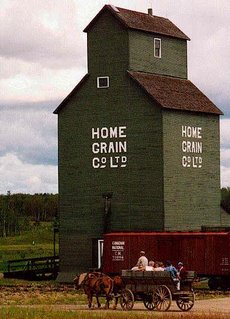
The Conservatives have pulled their coup on the farmers run Wheat Board.
And in firing the current CEO his replacement is pro privatization, pro corporate monopolies. Strahl made his firing public complete with staged rally.
Gosh the PM reads the biography of Stalin this summer and we get an autocratic PMO. Wonder what Strahl was reading this summer?
How To Stage Nuremburg Rallies, maybe.
He fired Adrian Measner, the board's president and a 34-year veteran of the organization, on Tuesday.
"It's time for the wheat board to make a buck for Canadian farmers and to quit fiddling around in the political game," Strahl said.
The minister made his announcement at a staged rally west of Winnipeg. Farmers who oppose the wheat board's current monopoly on international wheat and barley sales surrounded him.
Greg Arason, a former wheat board president, is the interim president. Arason supports the government's plan to end the board's monopoly.
Mr. Arason was President and CEO of the CWB between 1998 and 2002 and prior to that was CEO of Manitoba Pool Elevators. He has served as a director of a number of agri-business companies and industry associations including CanAmera Foods, Can-Oat Milling, The Chamber of Maritime Commerce, Canada Grains Council, Prince Rupert Grain, Westco Fertilizers, Western Grain Elevator Association, and XCAN Grain.
For more coverage of the Wheat Board from the Left see Buckdog.
See
Wheat Board
WTO
Farmers
ind blog posts, photos, events and more off-site about:
Canada, agriculture, wheat, WTO, G8, WheatBoard, farmers, Western-Canada, barley, wheat, Strahl, Government, Conservatives, Harper, Free-Trade, Klein, NDP, taxpayers, PR, propaganda,
Canada
Politics
Harper
CWB
Wheat Board
farming
Supply Side Management
Conservatives







